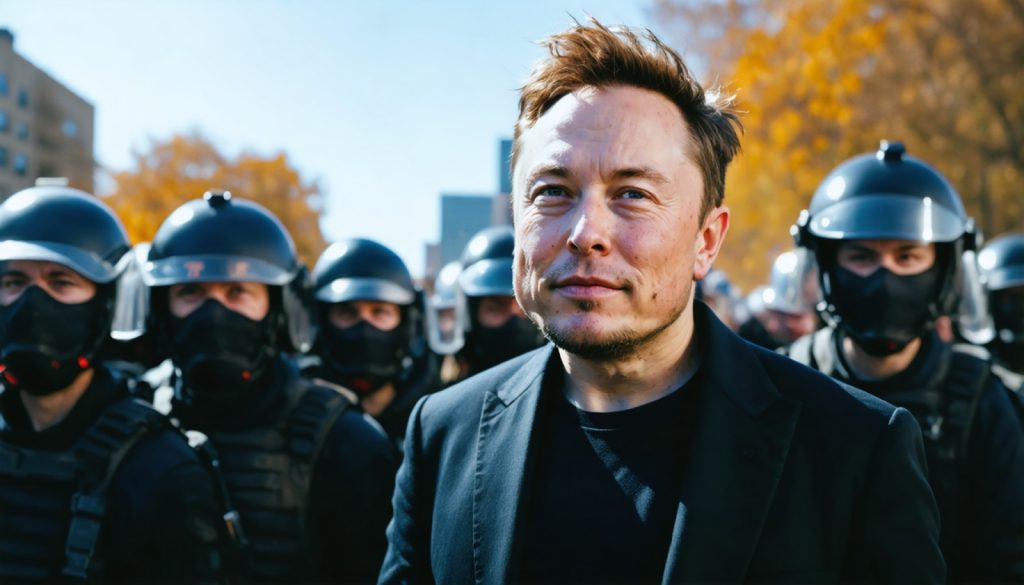
- The “Tesla Takedown” is a global protest against Elon Musk’s influence over government spending, emphasizing peaceful demonstrations.
- Protests have sparked both peaceful and violent actions, creating controversy over distinguishing between legitimate dissent and criminality.
- Former President Trump labeled violent incidents as “domestic terrorism” and suggested harsh measures, while Attorney General Pam Bondi vowed legal action against perceived conspirators.
- Elon Musk’s comments have intensified debates, potentially endangering peaceful protesters by equating dissent with terrorism.
- Activists remain committed to nonviolence, encouraging supporters to divest from Tesla to weaken Musk’s influence.
- There is concern over historical precedents where counterterrorism measures infringe on civil liberties and target peaceful protestors.
- Speculation surrounds potential surveillance of protests by federal agencies like the FBI.
- Protesters are advised to follow laws, avoid trespassing, and prepare legally to safeguard their rights.
Temblors of dissent are shaking Tesla’s high-tech universe. This week, organizers of the so-called “Tesla Takedown” have unleashed a worldwide movement, rallying thousands to fill the streets outside Tesla showrooms, dealerships, and charging stations. Their mission: to peacefully protest Elon Musk’s sweeping influence over government spending and demand accountability.
As these protests simmer across continents, a fierce backlash brews on the home front. Activists carry defiant placards, juxtaposed in the media spotlight with shadowy figures accused of flinging Molotov cocktails, blurring the lines between peaceful dissent and violent chaos. In the digital sphere and on Capitol Hill, this distinction is vanishing swiftly.
Calling the alleged attacks acts of “domestic terrorism,” former President Donald Trump has sounded a battle cry, threatening to deport “terrorist thugs” to prisons in El Salvador. U.S. Attorney General Pam Bondi vows legal action against those conspiring behind the scenes, even as evidence suggests these incidents are the work of individuals rather than orchestrated organizations. The legal rhetoric now risks ensnaring peaceful demonstrators in the dragnet designed for extremists.
Elon Musk’s own declarations have fueled this fraught discourse. His claims on X (formerly known as Twitter) accusing peaceful protesters of criminal activity have intensified the debate, equating legitimate dissent with criminality, and criminality with terrorism.
Here’s where the stakes escalate: If governmental bodies conflate all anti-Tesla actions with criminal intent, peaceful advocates may face severe repercussions typically reserved for violent extremists. For those like Mike German, a former FBI special agent, and expert on domestic terrorism, this sets a dangerous precedent. Historically, broad counterterrorism measures often trample on civil liberties, inadvertently targeting those exercising their First Amendment rights.
The Tesla Takedown, however, remains steadfast in its stance. The grassroots organization unequivocally champions nonviolence, urging supporters to sell their Tesla stocks and vehicles rather than resorting to physical confrontation. Their manifesto articulates a clear objective: economically weakening Musk to counter his perceived sway over federal agendas.
A titan of industry, Musk’s staggering net worth is largely tied to Tesla, valued at around $829 billion. This wealth fuels his empire and political endeavors, including his pivotal $44 billion acquisition of Twitter. Musk’s influence, critics argue, underpins significant political contributions, with more than $260 million to political action committees aiding Trump’s electoral strategies.
As the landscape of protest becomes a theater of surveillance, speculation mounts over potential covert operations by federal agencies. Recent whispers allude to an FBI initiative aimed at scrutinizing these protests, their Guidelines hinting at lenient thresholds for investigation. Indeed, corporations enjoy profound influence over America’s political and legal machinery, often portraying protests as law enforcement issues, diverting from genuine public grievances.
Silence from the FBI only deepens the intrigue as Tesla spills into the weekend spotlight, with over 213 protests orchestrated from Kentucky to Europe. In media appearances, Musk and Trump appear resolute, decrying their critics while hinting at clandestine machinations allegedly funded by partisan groups like ActBlue.
For Purdum and others spearheading this movement, staying safe while protesting remains paramount. They advise demonstrators to heed local laws, avoid trespassing, and be prepared with legal counsel. Frizzell, another organizer, articulates the enduring spirit of the cause: despite attempts to misconstrue peaceful dissent as violence, defending free speech and holding power accountable echoes the heart of democracy.
Tesla in Turmoil: Unveiling the Layers Behind the Global Protests
Understanding the Tesla Takedown Movement
The Tesla Takedown protests are a global phenomenon aiming to question and hold Elon Musk accountable for his expansive influence over government spending and corporate policies. Here’s what you need to know about this movement and the broader context surrounding it.
Key Insights and Market Trends
Elon Musk’s Influence and Financial Reach
Elon Musk, known for his substantial impact on technology and business sectors, extends his reach to political realms through significant donations to political action committees. His financial contributions, totaling over $260 million, allegedly support Trump’s campaigns and strategies.
Tesla’s Position in the Market
Tesla’s valuation, hovering around $829 billion, underscores its dominance in the electric vehicle (EV) market. This high valuation not only fuels Musk’s ventures, such as the $44 billion acquisition of Twitter but also solidifies Tesla’s position as a leader in innovation and sustainability.
Real-World Use Cases and Implications
Protests and Corporate Implications
Critics of Tesla encourage stockholders and Tesla owners to divest their interests as a form of economic dissent. This act aims to pressure Musk by affecting the financial standing of his company, thus diminishing his political leverage.
Freedom of Expression vs. Security Concerns
Activists face the challenge of balancing peaceful protest with the risk of being mischaracterized as violent instigators. With national security laws potentially affecting their activities, protestors should remain vigilant and informed about their rights.
Controversies & Limitations
Potential Surveillance and Civil Liberties
There are rumors about covert governmental surveillance of these protests, which could escalate tensions between protesters and law enforcement. Broad counterterrorism measures, while meant to ensure safety, might infringe on civil liberties and the right to peaceful assembly.
Public and Media Perception
Media portrayals of protests can vary widely, impacting public perception. Some narratives blur the line between peaceful dissent and criminality, complicating the discourse around activism and its role in democracy.
Safety and Legal Recommendations
1. Stay Informed: Keep updated on local laws regarding protests and ensure compliance.
2. Legal Readiness: Have legal counsel or resources on hand in case of detainment or legal challenges.
3. Peaceful Demonstration: Maintain nonviolence in actions to protect the integrity and objectives of the movement.
Conclusion: Immediate Action Steps
For anyone involved in the Tesla Takedown movement, ensuring personal safety and legal compliance is crucial. Divesting from Tesla, if aligned with your beliefs, can be a powerful statement. Understanding the larger implications of Musk’s influence, as well as the socio-political environment surrounding Tesla, is key to engaging effectively in this global conversation.
For broader consumer insights and electric vehicle news, consider visiting Tesla.
By engaging respectfully in such movements and staying informed, we can collectively strive for a balanced approach to holding power structures accountable.



